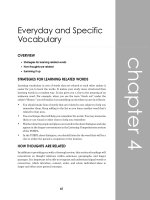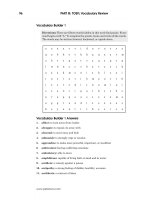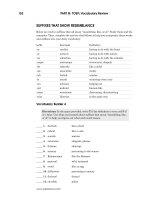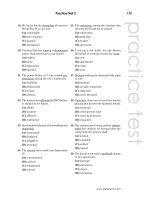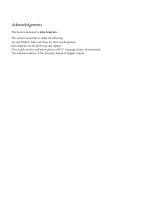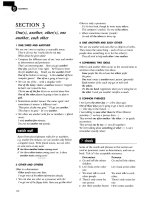Vocabulary general9 pps
Bạn đang xem bản rút gọn của tài liệu. Xem và tải ngay bản đầy đủ của tài liệu tại đây (62.31 KB, 11 trang )
verses/versus
VERSES/VERSUS
The “vs.” in a law case like “Brown vs. The Board of Education” stands for Latin versus (meaning
“against” ). Don’t confuse it with the word for lines of poetry—"verses"—when describing other
conflicts, like the upcoming football game featuring Oakesdale versus Pinewood.
List of errors
file:///C|/Temp/livres/commonerrors/errors/verses.html03/09/2005 15:40:22
very unique
VERY UNIQUE
UNIQUE
“Unique” singles out one of a kind. That “un” at the beginning is a form of “one.” A thing is unique (the only one of its kind) or it is not. Something may
be almost unique (there are very few like it), but nothing is “very unique."
List of errors
file:///C|/Temp/livres/commonerrors/errors/unique.html03/09/2005 15:40:22
vicious/viscous circle/cycle
VICIOUS/VISCOUS CIRCLE/CYCLE
The term “vicious circle” was invented by logicians to describe a form of fallacious circular argument
in which each term of the argument draws on the other: “Democracy is the best form of government
because democratic elections produce the best governments.” The phrase has been extended in
popular usage to all kinds of self-exacerbating processes such as this: poor people often find
themselves borrowing money to pay off their debts, but in the process create even more onerous debts
which in their turn will need to be financed by further borrowing. Sensing vaguely that such
destructive spirals are not closed loops, people have transmuted “vicious circle” into “vicious cycle.”
The problem with this perfectly logical change is that a lot of people know what the original “correct”
phrase was and are likely to scorn users of the new one. They go beyond scorn to contempt however
toward those poor souls who render the phrase as “viscous cycle.” Don’t use this expression unless
you are discussing a Harley-Davidson in dire need of an oil change.
List of errors
file:///C|/Temp/livres/commonerrors/errors/vicious.html03/09/2005 15:40:23
video/film
VIDEO/FILM
Many of us can remember when portable transistorized radios were ignorantly called “transistors.”
We have a tendency to abbreviate the names of various sorts of electronic technology (see stereo and
satellite), often in the process confusing the medium with the content. Video is the electronic
reproduction of images, and applies to broadcast and cable television, prerecorded videocassette
recordings (made on a videocassette recorder, or VCR), and related technologies. MTV appropriated
this broad term for a very narrow meaning: “videotaped productions of visual material meant to
accompany popular music recordings.” This is now what most people mean when they speak of “a
video,” unless they are “renting a video,” in which case they mean a videocassette or DVD recording
of a film. One also hears people referring to theatrical films that they happened to have viewed in
videotaped reproduction as “videos.” This is simply wrong. A film is a film (or movie), whether it is
projected on a screen from 35 or 70 mm film or broadcast via the NTSC, SECAM or PAL standard.
Orson Welles” Citizen Kane is not now and never will be a “video."
List of errors
file:///C|/Temp/livres/commonerrors/errors/video.html03/09/2005 15:40:23
vinegarette/vinaigrette
VINEGARETTE
VINAIGRETTE
Naive diners and restaurant workers alike commonly mispronounce the classic French dressing called “vinaigrette” as if it were “vinegarette.” To be
more sophisticated, say “vin-uh-GRETT” (the first syllable rhymes with “seen” ).
List of errors
file:///C|/Temp/livres/commonerrors/errors/vinegarette.html03/09/2005 15:40:23
viola/voila
VIOLA/VOILA
A viola is a flower or a musical instrument. The expression which means “behold!” is voila. It comes
from a French expression literally meaning “look there!” In French it is spelled with a grave accent
over the A, as voilà, but when it was adopted into English, it lost its accent. Such barbarous
misspellings as “vwala” are even worse, caused by the reluctance of English speakers to believe that
OI can represent the sound “wah,” as it usually does in French.
List of errors
file:///C|/Temp/livres/commonerrors/errors/voila.html03/09/2005 15:40:23
vitae
VITAE
VITA
Unless you are going to claim credit for accomplishments in previous incarnations, you should refer to your “vita,” not your “vitae.” All kidding aside,
the “ae” in “vitae” supposedly indicates the genitive rather than the plural; but the derivation of vita from curriculum vitae is purely speculative (see the
Oxford English Dictionary), and vitae on its own makes no sense grammatically.
“Résumé,” by the way, is a French word with both “Es” accented, and literally means “summary.” In English one often sees it without the accents, or
with only the second accent, neither of which is a serious error. But if you’re trying to show how multilingual you are, remember the first accent.
List of errors
file:///C|/Temp/livres/commonerrors/errors/vitae.html03/09/2005 15:40:24
volumptuous
VOLUMPTUOUS
VOLUPTUOUS
Given the current mania for slim, taut bodies, it is understandable—if amusing—that some folks should confuse voluptuousness with lumpiness. In fact,
“voluptuous” is derived from Latin voluptas, which refers to sensual pleasure and not to shape at all. A voluptuous body is a luxurious body.
List of errors
file:///C|/Temp/livres/commonerrors/errors/volumptuous.html03/09/2005 15:40:24
warrantee/warranty
WARRANTEE/WARRANTY
Confused by the spelling of “guarantee,” people often misspell the related word “warrantee” rather
than the correct “warranty.” “Warrantee” is a rare legal term that means “the person to whom a
warrant is made.” Although “guarantee” can be a verb (“we guarantee your satisfaction”), “warranty”
is not. The rarely used verb form is “to warrant.”
List of errors
file:///C|/Temp/livres/commonerrors/errors/warrantee.html03/09/2005 15:40:24
wary/weary/leery
WARY/WEARY/LEERY
People sometimes write “weary” (tired) when they mean “wary” (cautious) which is a close synonym
with “leery” which in the psychedelic era was often misspelled “leary"; but since Timothy Leary
faded from public consciousness, the correct spelling has prevailed.
List of errors
file:///C|/Temp/livres/commonerrors/errors/wary.html03/09/2005 15:40:24
wash
WASH
In my mother’s Oklahoma dialect, “wash” was pronounced “warsh,” and I was embarrassed to
discover in school that the inclusion of the superfluous “R” sound was considered ignorant. This has
made me all the more sensitive now that I live in Washington to the mispronunciation
“Warshington.” Some people tell you that after you “warsh” you should “wrench” (“rinse” ).
List of errors
file:///C|/Temp/livres/commonerrors/errors/wash.html03/09/2005 15:40:25


